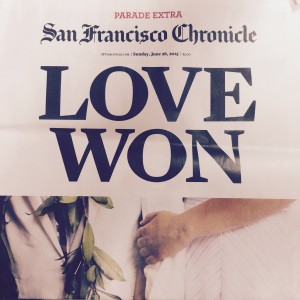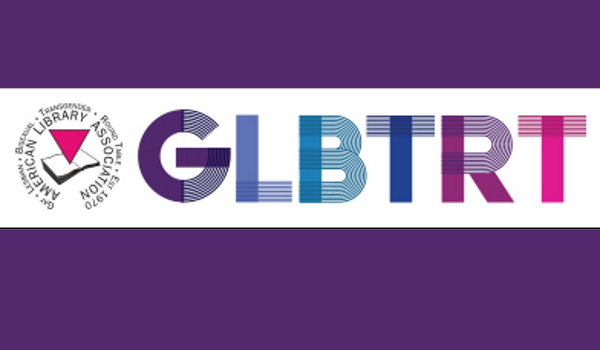By A. Faulkner
I called my dad the day of the decision. The newspapers were declaring “Love wins!”, but I wasn’t entirely sure I agreed with the headlines. I came out to my father a couple of years ago, so he knows my stance on same-sex marriage. My father is a born, raised, and well-aged Baptist, so I know his stance. But we didn’t debate the pros and cons of legalizing same-sex marriage. We debated whether or not the Supreme Court had the right to say anything at all about it.
 My admittedly amateur understanding is that the Supreme Court doesn’t get to rule on anything except whether or not the Constitution negates lesser statutes (which, in the US is, you know, everything). Unless the Constitution outright says “no,” we’re supposed to assume the issue is up for democratic, legislative debate. Obergefell v. Hodges thus came down to a fundamental argument about whether or not a right to marry was being infringed by state statutes excluding same-sex couples from the institution. Those who said, “yes, it’s a violation of fundamental rights,” were arguing mainly that opposite-sex-only marriage statutes violated the Due Process Clause of the Fourteenth Amendment, which basically says States cannot deprive anyone of life, liberty, or property. If you believe that the right to marry is a form of personal liberty, regardless of the sex of yourself and your chosen partner, then the Constitution says state statutes can’t infringe on this right. Those arguing against Obergefell et. al. argued that the issue at stake had nothing to do with the Fourteenth Amendment, and in fact the telling lack of any mention of the word ‘marriage’ in the Constitution means the right to define the term and set the related statutes was left entirely to the States. So Michigan, Kentucky, Ohio and Tennessee (and any other state) are well within their rights to define marriage as one man, one woman, and the potential for procreation.
My admittedly amateur understanding is that the Supreme Court doesn’t get to rule on anything except whether or not the Constitution negates lesser statutes (which, in the US is, you know, everything). Unless the Constitution outright says “no,” we’re supposed to assume the issue is up for democratic, legislative debate. Obergefell v. Hodges thus came down to a fundamental argument about whether or not a right to marry was being infringed by state statutes excluding same-sex couples from the institution. Those who said, “yes, it’s a violation of fundamental rights,” were arguing mainly that opposite-sex-only marriage statutes violated the Due Process Clause of the Fourteenth Amendment, which basically says States cannot deprive anyone of life, liberty, or property. If you believe that the right to marry is a form of personal liberty, regardless of the sex of yourself and your chosen partner, then the Constitution says state statutes can’t infringe on this right. Those arguing against Obergefell et. al. argued that the issue at stake had nothing to do with the Fourteenth Amendment, and in fact the telling lack of any mention of the word ‘marriage’ in the Constitution means the right to define the term and set the related statutes was left entirely to the States. So Michigan, Kentucky, Ohio and Tennessee (and any other state) are well within their rights to define marriage as one man, one woman, and the potential for procreation.
Perhaps it’s because I’m a librarian, and an avid lover of words, but for me this ultimately boiled down to a lingual debate. All the arguments rest upon the fundamental question of how we (as a Nation) define certain key terms, and who gets to say what’s what. Why don’t you try out your own definitions first?
- Liberty:
- Identity:
- Marriage:
Obviously, the last term was at the center of the squawking. But I’d argue the other two are equally important to the debate and that our definitions must build upon each other in the order of my list. I would guess that most can get behind one simple sentence: In the US, we are blessed with the liberty to define our personal identity as we see fit. This is a general statement and doesn’t account for absolutely all scenarios, but it is a casual truth. People are free to worship any god, many gods, or no god at all. They are free to drive a Prius or a Hummer, eat tofu or steak, watch Fox or CNN. They are free to have an intimate relationship with any adult human being who can give reasoned consent (at least since 2003).
Liberty. All of my examples are things anyone is free to do. I think liberty implies a freedom to action and that primarily it means no one (particularly the government) will restrict people from taking those actions they desire. Justice Thomas’s dissenting opinion goes into this discussion in some depth and concludes: “In the American legal tradition, liberty has long been understood as individual freedom from government action…” (7). In general, Americans get to tell the government to stuff it, and then proceed to do exactly what they dang well please.
Most people employ their liberty to a great extent in the pursuit of identity. Our personal identity is defined partly by nature, partly by nurture, but also partly by striking out on our own and making decisions that either coincide with, or deviate from, nature, nurture, or both. I believe identity is a hodgepodge of countless experiences, decisions, thoughts, and emotions, many of which continue to shift and change throughout our lives. One aspect of my own identity is my relationships. I am a daughter and a sister and a friend. I am my Beloved’s, to quote the Bible, and I think in that line from Song of Solomon, many of us can clearly see where the decision of whom we marry is very much a moment of self-definition. My life partner becomes an important part of my identity. That very identity we like to think we have the liberty to fully define as we see fit. In the Opinion of the Court, therefore, they conclude: “The right to marry thus dignifies couples who ‘wish to define themselves by their commitment to each other’ ” (14).
But the particular type of commitment in question is marriage. I can commit myself to the partner of my choosing, of my same or the opposite sex, in my heart, in a public ceremony, in a myriad of legal documents that entwine our lives (and our finances). But do I have a right to claim that so-vaunted word, that particular institution enshrined in State law and granted a particular “constellation of benefits” designed, so the states argued in Obergefell, primarily as a carrot to encourage potential procreators to do their horizontal dancing with legal fetters to ensure “the best atmosphere for raising children” (Syllabus, 4; Alito, J. Dissenting 6)? This is the sticking point.
I believe that the Due Process Clause of the Fourteenth Amendment grants me liberty and that I may use this liberty to define my identity, which will include committing myself to a same-sex partner. While I hold strongly to a fundamental right to commit as a right inherent in my right to liberty and using that liberty to define my identity, I’m uncomfortable with the Supreme Court using the word marriage so boldly in place of this broader concept of love and committing myself to another human being. There are many types of love and many types of commitment, after all, and within our Nation, the very specific commitment called marriage has always been defined by the States.
Ultimately Obergefell v. Hodges comes down to a lingual debate and, more importantly, an issue of who defines language. The five Supreme Court justices of the majority ruled that they got to define the term marriage, striking out the traditional, opposite-gender pair definition and replacing it with their own. Ultimately, I agree with their new-and-improved definition. I don’t really see any reason to add ‘gay’ or ‘same-sex’ as adjectives before marriage because I define the term mostly in light of a lifetime commitment and love, as opposed to the genders of the parties involved. But, do we want to ultimately grant this role of lingual arbiter to nine individuals?
Everyone has their own definitions for liberty, identity, and marriage. Do we want to give up our right to argue till we’re blue in the face, at ballot boxes and on the floor before our state legislatures, regarding our definitions of other words which will no doubt come under scrutiny as our laws continue to evolve? I honestly don’t think there’s much to the arguments against legalizing [same-sex] marriage besides: the Christian God says it’s a no-no, and heterosexual marriage is “the way we’ve always done it.” Neither of these is an argument that necessitates eternal state statutes enshrining the heterosexual matrimonial way, regardless of the endless harping in the dissenting opinions in this case. But I do think both of these stubborn views are something we should have continued to argue against, state by stinkin’ state, over the next twenty or thirty years. We (meaning our nation, and all the citizens in it all the way from NYC to the Bible Belt) should have had a chance to finish duking out the definition of ‘marriage’. We should be the ones defining our language and our laws moving forward. It would have been a real drag to fight for the right to marry, state by stinkin’ state, no doubt. But maybe it would have been a better way to win. Maybe it would have been the way to win without risking that thing called liberty for that thing called marriage.
I’m worried that with Obergefell v. Hodges, maybe love didn’t win. I’m worried hurt feelings, frustration, and anxiousness won. Or else love, more than winning, simply drowned out all objections. To be fair, that is often the way of love. But it is not the way of a democratic republic. Maybe it’s just because I’m a librarian, but I’d have rather we, the Nation, gotten to resolve the lingual debate ourselves.

